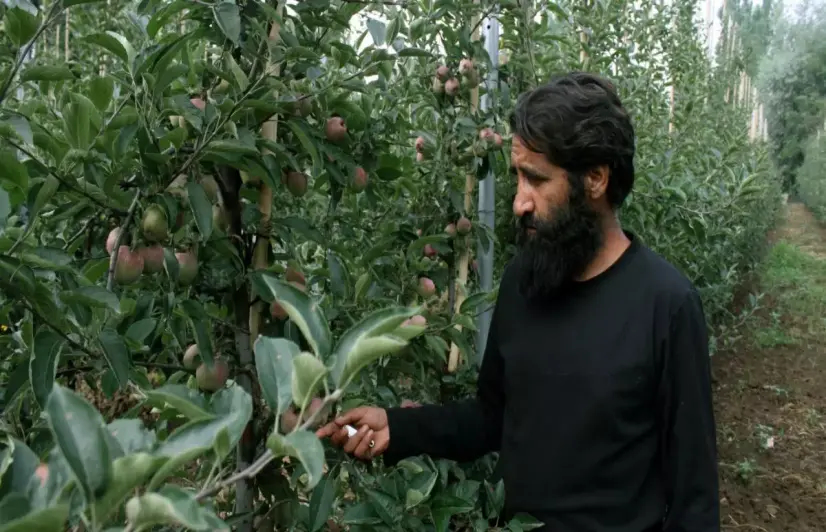Kashmir's apple farmers find fresh hope in high-density variety

Kashmir's apple farmers find fresh hope in high-density variety
The J&K administration is encouraging high-density apple plantations among farmers in Kashmir with a hope of boosting the wilting horticulture industry.
Srinagar: Famous for its mountain peaks, lakes and valleys, it is the apple that best represents Kashmir in the rest of India and the international market. Kashmir exports around 20 lakh metric tons of apples every year and produces around 75% of the country's apples. The volume of horticulture trade in Kashmir is estimated to be Rs 1,000 crores and over 33 lakh people are directly or indirectly dependent on it. The apple crop's already formidable contribution to Kashmir’s overall economy is being augmented by newer areas starting to come under apple cultivation.
In addition to the districts of Shopian, Pulwama, Anantnag, Kulgam in south Kashmir and Baramulla (Sopore), parts of Kupwara and Bandipora in north Kashmir that are famous for their apple orchards, some parts of central Kashmir's Srinagar, mostly known for tourism activities, and Budgam districts are also slowly shifting to apple farming.
With local apple growers severely affected by the economic instability wrought by political events and the COVID-19 pandemic, the administration believes that the promotion of high-density apple plantations will give a fillip to Kashmir's economy.
"There has been no significant increase in the production of this industry during the last few years in the Kashmir valley as a whole due to various reasons such as lack of cold storage and a large chain of commission agents between the grower and the consumer. The political instability had also contributed to our losses, especially in 2019," said a farmer, Riyaz Ahmed from the Shopian district.
In order to boost apple production, the Jammu and Kashmir government has rolled out several schemes and subsidies to promote high-density apple programmes in Kashmir.
The high-density apple plantation scheme has been widely embraced by the fruit growers who are fast ditching the traditional 'Delicious' variety of apples to adopt the high-density variety (locally called 'Italy variety'). This new crop grows faster and produces a much better yield, both in terms of quality and quantity.
"High-density orchards have many advantages over the traditional apple plants we have been growing for decades. This high-density variety takes a maximum of four years to grow and give yield while the traditional variety takes a minimum of 12 years. It saves time, gives more yield and the quantity of plants planted per hectare is also more. The high-density apple plants can be planted with a gap of 3-4 feet while a traditional apple plant needs a gap of more than two meters," said Javaid Ahmed from Nowpora village in Pulwama, who has converted his orchard into a high-density one. He said the quality of fruit produced by the high-density plants is better as it has a rich red colour and is juicy and big, thus fetching a better price.
The Director-General of the Department of Horticulture, Kashmir, Aijaz Ahmed Bhat, told 101Reporters that 252 hectares or 622.706 acres of land across Kashmir have been converted into high-density apple orchards as of now and the target for the next five years is 5,000 hectares.
Sources in the Civil Secretariat of Jammu and Kashmir said that the government has given clear cut instructions to the district level and field officers to ensure that the high-density plantation is implemented in a manner that benefits the maximum number of horticulturists across the length and breadth of Kashmir, with a special focus on apple rich districts.
"The guidelines have also been amended and relaxed. Earlier the farmer needed to have a minimum of 4 Kanals or 0.5 acres of land to be eligible for the scheme. Now there is neither a lower nor an upper limit. A farmer can go in for a high-density plantation even on land measuring less than 4 kanals," Bhat said.
He explained that the funding pattern is on a 50:50 ratio and the government will be providing a subsidy of Rs 1.75 lakhs per hectare to a farmer for a high-density plantation.
If a farmer chooses to set up a high-density orchard, they would first have to clear the existing trees and plant the new variety. In many cases so far, farmers who have enough land have used a part of it for high-density plantation while many others have replaced their traditional orchards entirely. "I don't think there are any huge losses if one converts a traditional orchard into a high-density one. It takes just three years for high-density apple plants to grow and give the full yield, which is better in both quality and quantity and has a good market. So where are the losses," said Mir Iqbal Ahmed, a horticulture entrepreneur from Avend village in Shopian, who has recently planted a new high-density orchard.
Farmers say that the drip irrigation system is the only additional investment one has to make for a high-density orchard but that is usually covered in the subsidy provided by the government. "The high-density plants also need to be handled with extra care, with timely irrigation and application of pesticides and fertilisers," said another farmer, Ghulam Mohd Alaie from Pulwama district.
Would you like to Support us
101 Stories Around The Web
Explore All NewsAbout the Reporter
Write For 101Reporters
Would you like to Support us
Follow Us On

